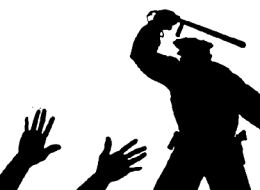Root Causes and Police Behaviour

There's clearly much more to this story than we get from the recorded incident
itself. As with the case of George
Zimmerman or even the Boston
Marathon bombing, reacting to what one audience wants us to see isn't
enough - not if we are truly interested in solutions.
The first point
worth noting - the guy who is being bullied by the Durham officer remains calm
throughout, even utters phrases that support a one-sided interpretation of the
incident. He also knew it was being filmed, which gave him an advantage.
That's why I'm
such a strong advocate of always acting as though you're under public scrutiny,
whatever the context; with social media and hand-cams, you never know what's
going to be used against you down the road.
Who was the man? Why were the police there? What's the history? What are
the strengths and dispositions of both parties involved? What the officer
did was clearly inappropriate, but what led him to act that way? Does he
have a history of aggressive behaviour? Was there something in his personal or
professional life that led him to have a bad day? If there were three
officers present - why was he the one at the door? Why was he there on his own?
We can focus on punishment, but without a clear understanding of what's at play
in this situation we can't provide justice. It's as simple as that.
Back to the officer himself for a minute; I find it interesting the Star chose
to do a mini-profile on him, emphasizing his commitment to supporting fallen
soldiers and driving a big car. What they're attempting to do is portray
a fellow with limbic-motivated behaviour; wants to look tough, be strong for
his community and has the back of fellow front-line security forces.
This is the kind of person we want
serving on the front lines; tough, focused, unafraid to tackle threatening
situations on behalf of the public good. But what's the flipside of that
profile? Toronto Mayor Ford is that kind of guy, but
he's also a bully. Can a direct correlation be made between the
profiles we hire for and the behaviour that results?
Then, there's the nature of police work itself. Police are like teachers
- we can bitch all we want about excesses, demands or whatever, but the fact
remains very few of us have any interest in doing that job. It's hard,
draining, rarely understood or appreciated by the general public and in the
case of police (and sometimes, teachers) life-threatening.
If we don't understand the intricate nature of the work, how can we be sure
we're supporting it appropriately? The truth is we can't - and we don't.
One case in
point - mental health. Front-line police officers are all too often first
and last point of contact between people with mental illness and the justice
system (though if the right services). Yet, they get next to no training
on the nature of mental illness, how it manifests itself and best practices for
managing down behaviour under specific contexts.
Police get NO
training on how to monitor their own mental health and techniques to better
monitor and course-correct their own mental health, or seek support/help peers
get support as needed. That comes down to outdated notions of strength -
the idea is that only weak people deal with depression or anxiety, and you
can't be weak if you want to be a cop. No, it's
far better to save it all up until you have PTSD - which can result in the
sorts of behaviour displayed in this scenario.
With all that in mind, let's go back and re-visit this
incident and determine how it could have played out differently:
When the officer
approaches the man, first thing he does is let him know the encounter is being
recorded. All such encounters should be
recorded; this protects the officers and citizens from he said/she said controversies,
but also provides a measure of encouragement for all parties to act as though
the world is watching.
The officer
employs self-regulation techniques (such
as those learned through positive psychology) to keep his own emotional
engagement in check. The officer also
employs empathy/sympathy generation techniques as are often used by master
interrogators to elicit the desired response.
The officer
doesn’t approach the door individually – there is a pair of officers who make a
point of introducing and humanizing themselves to the person first; this fact,
combined with the video recording, makes it harder for the person on the
receiving end to suggest he felt intimidated or bullied by the officers.
If officer A
becomes agitated despite his internal training – he is, after all, human – then
his colleague will step in to provide social-emotional support; not to corner
the person being spoken to but to empower his partner who takes the lead.
These officers
would have started their day with an equivalent to the Talking Circle, which
would allow their supervisor to gauge the team’s emotional temperature, see if
there were any personal concerns that could impact performance and
support/assign duties to his team as necessary.
This isn’t about
coddling, enabling or pandering. It’s
about ensuring we have a Justice system that functions the way it’s supposed to
and front-line service providers who have the training, support and accommodations
they need to do their very difficult job effectively.
But this only
happens if we’re interested in solutions.
If instead, we want to take the
Stephen Harper approach to Justice, we can keep on heavily penalizing
people for their actions without an understanding of the root causes that lead
to them. That’s an inefficient use of
resources and has contributed to the massive
justice challenges and mental health crisis we face today.


No comments:
Post a Comment